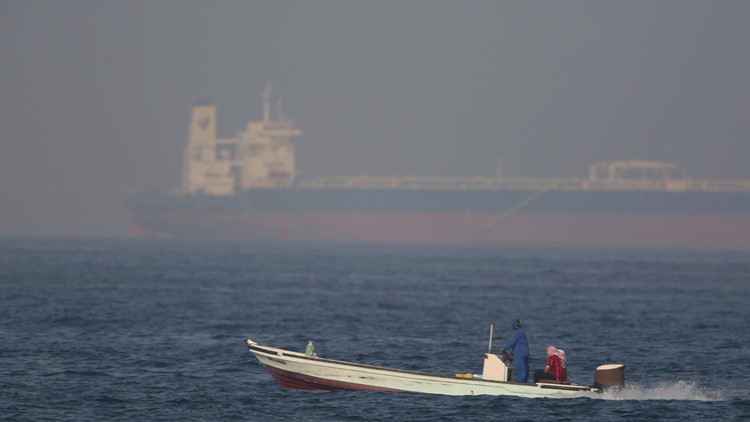WASHINGTON (AP) — The Pentagon on Monday ordered another 1,000 American troops to the Middle East, moving to bolster security in a region reeling from hostile attacks on commercial ships that the U.S. has blamed on Iran.
Officials said the deployment includes security forces and troops for additional surveillance and intelligence gathering in the region. And while the number is small, it represents an escalation of U.S. military might aimed at deterring Iran and calming allies worried that transit through key shipping lanes could be in jeopardy.
Acting Defense Secretary Patrick Shanahan issued a statement saying the forces are "for defensive purposes to address air, naval, and ground-based threats in the Middle East."
The forces are part of a broader military package of options that were initially laid out to U.S. leaders late last month, totaling as much as 10,000 forces, Patriot missile batteries, aircraft and ships. The decision to send 1,000 troops signals a measured approached by President Donald Trump, who campaigned against the Mideast entanglements of his predecessors and has struggled to bring troops home, despite ongoing threats.
"The United States does not seek conflict with Iran," Shanahan said. "The action today is being taken to ensure the safety and welfare of our military personnel working throughout the region and to protect our national interests." He added that the U.S. will continue to adjust troop levels as needed.
The troop decision comes as Secretary of State Mike Pompeo and other top officials reached out to leaders in Asia and Europe to convince them that Iran was behind the alleged attacks on ships in the Middle East. The Pentagon released new photos intended to bolster its case that Iran was to blame.
The images, many taken from a Navy helicopter, show what the Pentagon said were Iranian forces removing an unexploded mine from the side of the Japanese-owned Kokuka Courageous oil tanker in the Gulf of Oman.
Officials last week said the move appeared to be an attempt to remove forensic evidence from the scene of the attack. But it's not clear if examination of the mine would have made it definitively clear that the device was planted by the IRGC.
The Trump administration also finds itself in the awkward position of demanding that Iran comply with a nuclear accord that the president has derided as the worst deal in history.
Iran announced Monday it would break a limit on uranium stockpiles established by a 2015 agreement with world powers that was intended to restrict the Islamic Republic's nuclear program in exchange for an easing of international sanctions.
Trump withdrew from the agreement, signed by his predecessor, and reinstated punishing economic sanctions, resulting in sharply rising tensions that deteriorated further with Iran's warning that it could soon start to enrich uranium to just a step away from weapons-grade levels.
That put the State Department in the position of defending the limits set by the 2015 deal that was so maligned by Trump and his national security team.
"We continue to call on the Iranian regime not to obtain a nuclear weapon, to abide by their commitments to the international community," State Department spokeswoman Morgan Ortagus told reporters.
Ortagus said Iran's uranium announcement amounted to "extortion" and a "challenge to international norms," as well as to the 2015 agreement known formally as the Joint Comprehensive Plan of Action.
"It's unfortunate that they have made this announcement today," Ortagus said. "It doesn't surprise anybody and this is why the president has often said that the JCPOA needs to be replaced with a better deal."
Supporters of the deal blamed the Trump administration for Iran's provocative announcements, saying they were entirely predictable given the renewed U.S. pressure.
"While Iran's frustration with Trump's reckless and irresponsible pressure campaign is understandable, we strongly urge Iran to remain in compliance with the nuclear deal," the Arms Control Association said in a statement. "It remains in Iran's interests to abide by the limits of the agreement and to fully cooperate with the International Atomic Energy Agency's more intrusive monitoring and verification."
Iran has shown no willingness to negotiate another deal and vowed not enter into talks with the United States while the administration maintains its "maximum pressure" campaign of sanctions.
Administration officials are grappling with whether to press the remaining parties to the deal, including Britain, France and Germany, to demand that Iran stay in compliance. They must also consider if such a stance would essentially concede that the restrictions imposed during the Obama administration, while short of ideal, are better than none.
Under the deal, Iran can keep a stockpile of no more than 660 pounds (300 kilograms) of low-enriched uranium. Behrouz Kamalvandi, spokesman for Iran's atomic agency, said it would pass that limit June 27.
A senior U.S. official said the administration is most concerned about any violation of the deal that would reduce the breakout time Iran would need to produce a nuclear weapon. The deal aimed to keep the breakout time at one year.
The official said certain violations, while they should be not accepted, would not necessarily reduce that time. But other violations, such as enriching uranium to 20%, should be addressed immediately if they occur, the official said. The official was not authorized to discuss the matter publicly and spoke on condition of anonymity.
The official said it would be up to the Europeans to decide if Iran was in violation of the deal and whether to initiate a dispute resolution mechanism that could bring the Iranians back into compliance. Pompeo is expected to meet this week with E.U. foreign policy chief Federica Mogherini, a leading deal proponent, and this issue is likely to be raised.
Full Statement From Acting Secretary of Defense Patrick Shanahan on Additional Forces to U.S. Central Command:
In response to a request from the U.S. Central Command (CENTCOM) for additional forces, and with the advice of the Chairman of the Joint Chiefs of Staff and in consultation with the White House, I have authorized approximately 1,000 additional troops for defensive purposes to address air, naval, and ground-based threats in the Middle East.
The recent Iranian attacks validate the reliable, credible intelligence we have received on hostile behavior by Iranian forces and their proxy groups that threaten United States personnel and interests across the region.
The United States does not seek conflict with Iran. The action today is being taken to ensure the safety and welfare of our military personnel working throughout the region and to protect our national interests. We will continue to monitor the situation diligently and make adjustments to force levels as necessary given intelligence reporting and credible threats.



